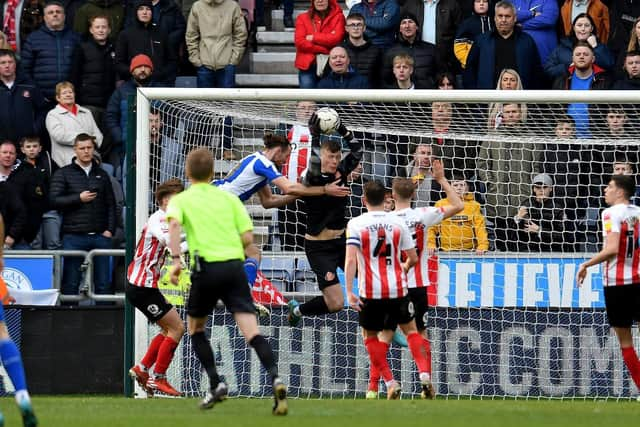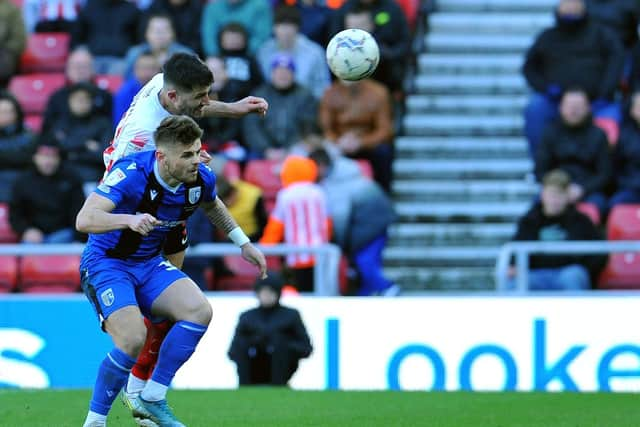Alex Neil gives fascinating insight into how he has fixed Sunderland's biggest problem in their promotion battle
and live on Freeview channel 276
To do that, he identified one clear area for improvement: “If you look at any of the key indicators in terms of getting out of the division, Wigan and Rotherham who are currently one and two in the division, are in the top three for every single defensive statistic that you can think of.
“With some of them, you were lucky if we were in the top half.
Advertisement
Hide AdAdvertisement
Hide Ad“The simple fact is that we didn't defend well enough, we didn't keep enough clean sheets, and that wasn't giving us a platform to go on and win enough points.


“That was a problem.”
A day later, they would keep their fifth clean sheet in six league games.
Under Neil, Sunderland's expected goals against per game has dropped to just 0.85 (from 1.29 for the season as a whole), which over the course of the campaign would put them behind only Wigan as the division’s best defence.
On every defensive metric, they have improved significantly.


So how has he done it?
Advertisement
Hide AdAdvertisement
Hide AdHere we explain how, with input from the head coach himself…
SHAPE AND PERSONNEL
Arguably the key to Neil’s success in improving Sunderland’s defensive record has been his willingness to alter both shape and personnel from game to game, depending on the opposition’s strengths.
To begin with he had little choice; identifying that Callum Doyle was at risk of burnout and with alternatives at the time threadbare at best.
It led to him often deploying what is an unusual back three in terms of personnel, but one that addressed a key weakness in the side.
Advertisement
Hide AdAdvertisement
Hide AdBoth Carl Winchester and Dennis Cirkin are comfortable stepping out with the ball and advancing into the channel when required, but first and foremost they have added more pace and cover either side of Bailey Wright, who has been central to Neil’s plans.
The extra body behind the ball has been particularly key when Sunderland have lined up against an opposition who play with a front two. Particularly on the road, it was something the Black Cats had struggled with early in the season.
“Structurally, we've added another player in there, going to a back three for a lot of the games,” Neil explained.
“We've also added an extra element of pace back there, with the likes of Dennis Cirkin and Winny operating in that backline.
“What it has done is make us more defensively solid.”
Neil has tinkered with that formula on occasions, though.
Advertisement
Hide AdAdvertisement
Hide AdAgainst Wigan Athletic, a lack of options meant giving Arbenit Xhemajli a league debut after a long period on the sidelines with injury. Neil had absolutely no concerns about Xhemajli’s defensive attributes, but understandably worried about exposing both him and Wright in 1-v-1 situations. So on this occasion Sunderland tightened up significantly right across the pitch, defending narrow and relatively deep, pressing significantly less and asking their wingers to defend with extreme discipline. Xhemajli was superb, and the Black Cats kept a clean sheet.
Similarly, Neil sprung a surprise on Saturday when bringing Danny Batth back into the starting XI alongside Wright.
Batth’s ankle issues meant he had not featured under Neil up until that point, but the head coach felt Gillingham’s main attacking threat would be from set pieces, and Sunderland’s physical partnership won just about everything in those scenarios. Crucially, they also won the vast majority of duels against Vadaine Oliver, which prevented Gillingham being able to get out of their own half as their attempts to go back to front quickly failed. Eventually, that pressure told.
Neil’s preference to tailor each game plan to the opponent, at least at this stage, was summed up by Xhemajli being preferred to Callum Doyle on the bench.
Advertisement
Hide AdAdvertisement
Hide AdNeil was clear afterwards that in future games where he feels quality in possession from defence is key, Doyle will feature.
That game-to-game approach has yielded success so far, and would be a cause for optimism for supporters if Sunderland were able to force their way into the play-off lottery.
And while he has been protected superbly by the defence in front of him, Anthony Patterson’s growing stature and solid distribution has represented another step forward.
CORRECTING A KEY STRUCTURAL ISSUE
One of Sunderland’s biggest weaknesses in the games just before and just after Neil’s arrival was their tendency to be exposed too easily on the counter attack.
Advertisement
Hide AdAdvertisement
Hide AdParticularly on home turf, it meant that despite their dominance of possession and the shot count, the Black Cats were giving up high-quality chances to their opposition.
It led to defeat against Lincoln City and Doncaster Rovers before Neil’s arrival, defeat to MK Dons shortly afterwards and then a damaging draw with Burton Albion days later.
It has been a key training-ground focus for Neil and Saturday was another example of that work beginning to pay dividends.
“What we've also done is a lot of work on when we have the ball and we're attacking, what the defensive structure looks like in terms of [the threat of] the counter-attack so we can snuff it out and prevent it from being an attack on our goal,” Neil explained.
Advertisement
Hide AdAdvertisement
Hide Ad“That's when you're at your most vulnerable, and I think that we've done that particularly well.”
This focus also explains why the head coach has so regularly included Corry Evans, whose selection can often be divisive given the presence of creative talents such as Dan Neil and Jay Matete on the bench.
“In terms of the midfield, it’s only really one player who we’ve asked to be more defensive,” Neil explained
“Whoever the six looks like, so if it's Corry Evans who has done that job a lot, I think his starting position when we're in possession, albeit he offers up to be that release pass so we can filter the ball out to the other side, equally he's the one that when the play turns over and we lose possession, he's the one who needs to understand where their ten or nine is and then get into position very quickly.
“That's something he's done very well.”
Advertisement
Hide AdAdvertisement
Hide AdA MAJOR STEP FORWARD
Interestingly, Neil also referenced one key statistical benchmark when talking about how his side had embraced becoming more difficult to beat.
The passes-per-defensive action metric measures how many passes a team allows the opposition to make near their own goal before attempting to disrupt them.
Under Neil, Sunderland have gone from middling to top-tier in the division.
“I think that's been proven in the stats, on PPDA we've gone from twelfth or thirteenth to the top two in the last eight games,” Neil said.
Advertisement
Hide AdAdvertisement
Hide Ad“We've made a dramatic improvement in terms of hunting the ball and winning it back.
“That's something we've shown the players.”
On Wyscout’s model, Sunderland’s PPDA under Neil is 5.41, a dramatic decrease from 8.59 across the season as a whole.
Across the campaign those numbers under Neil would make Sunderland the most aggressive pressing side in the division, with Rotherham currently leading the way on 7.31
This is significant in the long as well as the shorter term, as pressing is a core tenet of the club’s playing philosophy. On this metric, Neil is proving himself a good fit.